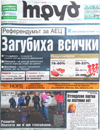
Called on to decide if “Bulgaria should further develop nuclear energy with the construction of a new atomic power station”, 61 per cent of those who voted answered “yes” in the country’s 27 January referendum. However, only 20 per cent of the electorate went to the polls, and the outcome of the first ever popular vote in the history of post-communist Bulgaria has been deemed invalid for failing to attract a minimum turnout of 60 per cent. The decision to hold a referendum had been prompted by controversy over the construction of a second nuclear power station at Belene in the north of the country, following a decision to suspend work on the project in 2012.
Although advocates and opponents of the power station have hailed the outcome of the vote as a victory, Trud argues that the result amounts to "a defeat for everyone". For the daily, the country’s first ever exercise of direct democracy has turned out to be a fiasco which will be regretted by Bulgaria’s citizens. It is also a setback for the left-wing opposition, which had campaigned for a vote, because it proved to be unable to mobilise the electorate. Finally, the result is bad for the right, which is opposed to the project, because those who voted approved of the power station.
We came very close to "a total fiasco", remarks Standart, which notes that the 20 per cent turnout will at least enable the initiators of the referendum to obtain "a debate on the issue of the construction of a second power station in the country’s next parliament".
But how should the lack of interest in the issue be explained? The Bulgarian media has remarked on the "politicisation" of the referendum, which has widely been seen as a prelude to general elections to be held this summer.
Was this article useful? If so we are delighted!
It is freely available because we believe that the right to free and independent information is essential for democracy. But this right is not guaranteed forever, and independence comes at a cost. We need your support in order to continue publishing independent, multilingual news for all Europeans.
Discover our subscription offers and their exclusive benefits and become a member of our community now!











